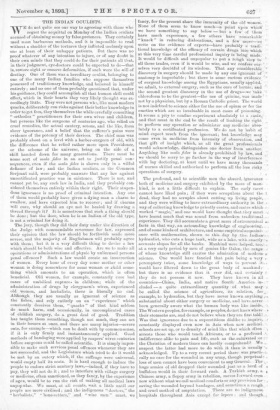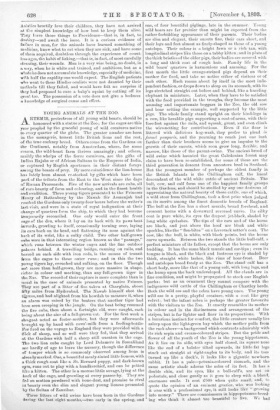THE INDIAN OCULISTS.
WE do not quite see our way to agreeing with those who regret the acquittal on Monday of the Indian oculists accused of obtaining money by false,pretences. They certainly used most barbarous methods, and it is impossible to read without a shudder of the tortures they inflicted uselessly upon one at least of their unhappy patients. But there was no Proof whatever of any intention to injure, or of any doubt in their own minds that they could do for their patients all that, in their judgment, eye-doctors could be expected to do—that is, restore sight or remove deformities, if such were the will of destiny. One of them was a hereditary oculist, belonging to one of the many Indian families who suppose themselves possessed of traditionary knowledge, and believed in himself entirely ; and no one of them probably questioned that, under his guidance, they could accomplish all that human skill could effects which in their hearts they very likely thought was ex- ceedingly little. They were not persons who, like most modern quacks, deliberately run risks against their better knowledge in order to get fees, they themselves the while carefully consulting " orthodox " practitioners for their own wives and children, but persons like the surgeons of centuries ago, who relied on cruel remedies, the actual cautery, setons, and the like, from sheer ignorance, and a belief that the sufferer's pains were evidence of the potency of their devices. The chief man was probably about on a level with a barber-surgeon of old, with the difference that he relied rather more upon Providence, or the scheme of the universe, being on the side of a skill handed down for many generations. There must be some sort of raa/a fides in an act to justify penal con- sequences, even if the mak& fides is shown only in a wilful defiance of law ; and the Indian oculists, as the Common Serjeant said, were probably ,unaware that any law against uncertificated practice was in existence. There is not, and cannot yet be, any such law in India, and they probably con- sidered themselves entirely within their right. Their stupen- dous ignorance is no proof of criminal intention. Any one of them would probably have given a dying man a charm to swallow, and have expected him to recover; and if charms will cure, why should an eye not be healed by drawing a thread through it P It is monstrous that such a thing should be done; but the doer, when he is an Indian of the old type, is not a criminal for doing it The jury, though they did their duty under the direction of the Judge with commendable reverence for law, expressed their opinion that the law should be forthwith made more severe, and the majority of Englishmen will probably agree with them ; but it is a very difficult thing to devise a law which should be both wise and effective. Are we to make all operations or administrations of physic by unlicensed persons penal offences P Such a law would create an insurrection of women. Every hour of every day some mother or other woman is doing somewhere for some woman or child some- thing which amounts to an operation, which is often beneficial. Old women, for example, constantly cure bad cases of umbilical rupture. in children; while of the administration, of drugs by clergymen's wives, experienced old women, and herbalists, there is literally no end: Although they are usually as ignorant of science as the fishes, and rely entirely on an " experience " which constantly deceives them, " quacks " of that kind seldom do much harm, and occasionally, in uncomplicated cases of childish surgery, do a great deal of good. Tradition has taught them something, though not much, they can act in their horses at once, and there are many injuries—severe cuts, for example—which can be dealt with by common-sense, if it is only firmly and instantaneously applied. Good methods of bandaging were applied by reapers' wives centuries before surgeons could be called scientific. It is simply impos- sible to make such services penal offences whenever they are not successful, and the Legislature which tried to do it would be met by an outcry which, if the suffrage were universal, would empty half its seats. It is hard enough to induce the people to endure strict sanitary laws,—indeed, if they have to pay, they will not do it ; and to interfere with village surgery or medicine, often sanctioned, as they fancy, by the experience of ages, would be to run the risk of making all medical laws unpop ular. We must, at all events, wait a little until our people are more civilised ; and the indigenous "doctors," the " herbalists," " bone-setters," and " wise men " must, we fancy, for the present share the immunity of the old women. None of them seem to know much—a point upon which we have something to say below — but a few of them have much experience, a few others have remarkable' " knack " in reducing dislocations, and a few more—we write on the evidence of experts—have probably a tradi- tional knowledge of the efficacy of certain drugs intp whieh at this very time careful professional inquiry is being made. It would be difficult and unpopular to put a rough stop to all these trades, even if it would be wise, and we confess our- ' selves very doubtful of its wisdom. That any considerable discovery in surgery should be made by any one ignorant of anatomy is improbable ; but there is some curious evidence, of surgical knowledge among the Egyptians, usually applied, we admit, to external surgery, such as the cure of hernia; and the second greatest discovery in the use of drugs—we take chloroform to be the greatest—the use of quinine, was made not by a physician, but by a Roman Catholic priest. The world is not indebted to science either for the use of opium or for the emetics which are so invaluable in most cases of poisoning. It seems a pity to confine experiment absolutely to a caste,, and that must in the end be the result of limiting the right to perform any operation or administer any medicine abSo- lutely to a certificated profession. We do not by habit of mind expect much from the ignorant ; but knowledge may come even in medicine from intensity of observation, and that gift of insight which, as all the great professionals would acknowledge, distinguishes one doctor from another. Anything like moda fides is already prohibited by law, and we should be sorry to go farther in the way of interference with lay doctoring, at least until we have many thousands of nurses skilled and authorised to perform all the less risky operations of surgery. • The profound, and to scientific men the absurd, ignorance both of medicine and surgery exhibited by the mass of man- kind, is not a little difficult to explain. The early races , cannot have liked pain ; if they were scrupulous about the F. dead, they had no scruples about cutting up living people, and they were willing to leave extraordinary authority in the • way of collecting knowledge to priestly castes, and castes which worked "magic," and one would have thought that.they must . have learnt much that was sound from unbroken traditional experience. They did accumulate a great mass of astronomical e, facts in that way, an astounding knowledge of engineering, and of some kinds of architecture, and some empiricalacquaint- ance with mathematics, shown to this day by the, Indian' hydraulist, who outs a huge tank, wide as a lake, with exactly accurate slopes for all the banks. Mankind were helped, too; 4. at a very early period by men of genius like Galen, the range of whose knowledge still excites the admiration of modern. science. One would have fancied that pain being a very , peremptory tutor, some knowledge of ways to prevent it, , would have filtered down to the great body of mankind ; but there is no evidence that it ever did, and certainly they do not possess it now. They have known in all countries—China, India, and native South America in- cluded — a quite extraordinary quantity of what may be called the science of agriculture, its relation, for ,; example, to hydraulics, but they have never known anything e • substantial about either surgery or medicine, and have never been generally aware what the human body was like inside. The Western peoples, for example, as peoples, do not know where their stomachs are, and do not believe when they are first told Was that ignorance due to a superstitious dislike to inquire, constantly displayed even now in Asia when new medical schools are set up, or to density of mind like that which often arrests those who would teach Africans, or to a profound indifference alike to pain and life, such as the, cultivated or the Christian of modern times can hardly comprehend P. We suspect the latter had more to do with it than is usually acknowledged. Up to a very recent period there was practi., cally no care for the wounded in any army, though perpetual loss of men cannot have been convenient to any General. The huge armies of old dropped their wounded just as a herd of t buffaloes would in their forward rush. A Turkish army, a Chinese army, a Sepoy army in rebellion, moves forward even now without what we call medical comforts or any provision for • , saving the wounded beyond bandages, and sometimes a rough and cruel method of amputation. There are no indigetione hospitals throughout Asia except for lepers ; and though, ; Asiatics heartily love their children, they have not arrived at the simplest knowledge of how best to keep them alive. They leave those things to Providence—that is, in fact, to destiny—and await the issue. It is a curious evidence of failure in man, for the animals have learned something of medicine, know what to eat when they are sick, and have some of them acquired, doubtless through the experience of count• less ages, the habit of licking,—that is, in fact, of most carefully cleaning, their wounds. Man is a very wise being, no doubt, in a way, when he is white and trained, and ambitious, but as a whole he does not accumulate knowledge, especially of medicine, with half the rapidity one would expect. The English patients who went to these Hindoo oculists were not daunted by their methods till they failed, and would have felt no surprise if they had proposed to cure a baby's squint by cutting off its great toe. The possession of a vote does not give a hodman a knowledge of surgical cause and effect.





















































 Previous page
Previous page